- Home
- Madeleine Roux
Sadie Walker Is Stranded Page 25
Sadie Walker Is Stranded Read online
Page 25
Stefano sniffed.
Our gunmen picked off what members of the horde they could, but not fast enough. Noah would be devoured if he didn’t move. But there was nowhere to go. He was trapped, pinned by the undead before him and the water below. Still, we watched, dumbstruck, as the torch danced down the dock.
“What is he—” Andrea began, siding up next to me. Shane grabbed onto my shirt, squeezing.
“Whelan!” I could see it. I could see it all unfolding. It would be an accident, just an error in judgment, a well-meant gesture that might only make us worse off. “Whelan, you have to stop him!” I rushed out of the safety of the circle, jogging down toward the water.
“Go back,” Whelan said as I collided into his side. The smell of gunpowder was overpowering, ashen and bright. “Get out of here. Now, Sadie.”
“We have to stop him!” I pointed. Whelan followed the trajectory of my finger. Then he was darting off toward the dock, leaving behind the imprint of his warmth, a shadow, and that lingering smell of gunpowder.
Down on the dock, Noah’s torch flared. Banana took my hand, her clips empty, her skin clammy and too-warm. I heard Whelan’s heavy tread on the dock planks and then heard Noah’s scream. The torch overbalanced, falling in a slow arc that would have been beautiful were it not so foreboding. He had tripped, or been pushed or maybe tackled, but not into the water. The effect was instantaneous. Clothes caught fire, undead screaming their unnatural cries as the flames spread and jumped, feeding. Noah’s voice dimmed, overwhelmed, the undead consuming him even as the fire consumed them all.
More disturbingly still, none of the zombies attempted to put themselves out. They had found one meal and would destroy it. That was their one purpose. They made no effort to peel off and dive into the water. They simply burned—burned as they ate, screaming in protest of the flames even as they did nothing to stop them.
And then everything could be seen perfectly as the flames found new paths, leaping up as the whole tangled, burning mess of Noah and the slavering mob tumbled into the boat. It was bigger than Arturo’s Ketch but still a sailboat. Whatever additive was in the wood spurred the fire and the greedy flames were soon searing a path straight up the mainmast.
“Back up!” Whelan had turned, fleeing down the dock toward us. “Fuck, fuck, fuck … Get back!”
Banana dragged me toward the cabins, both of us walking backward as we watched, horrified and transfixed, as our best hope to leave the island went up in flames, and Noah with it. The tuffs of fire on the dock went out, sputtering, as the boat became one blazing cone of heat and light. Whelan caught up to us, pushing insistently, gasping for breath as he shouldered us back toward the others.
It was obvious why. The flames covered the deck of the sailboat and touched, inevitably, the outboard motor’s gas compartment. One collective gasp went up as the back of the boat seemed to rear up, exploding, shards of flaming wood streaming out in every direction, arcing like a Fourth of July display. The smell of char and gasoline filled in the space around us as the fireball became one mass, undead indistinguishable from wreckage.
A single moan trickled over from my left, silenced a second later by Whelan’s rifle barking back. I couldn’t move. The surface of the water seemed to be igniting, the boat burning down, its cast off pieces in flames until they too dwindled, spent. The bulk of the sailboat would take a while to flame out, but when it did …
Unless we could all fit into Whelan’s canoe or fix Arturo’s boat, we were stuck. We were stranded.
TWENTY
We had come to a point where even articulating the losses was too difficult. Condolences were given with looks, touches on the shoulder or back, and the silence was more comforting than any longwinded speech.
Every time I opened my mouth to say something, even something as mundane and little as “good morning,” I found my throat closing up. It was easier to say nothing and avoid the threat of tears.
Losing Noah and the boat did something to Whelan. He took every loss hard, but this one was different. He helped me bury all but one of Noah’s books. I wanted one to keep around, foolishly, to sort of remember him by, or maybe to keep it as a reminder of why sometimes keeping your damned mouth shut is a good idea. He had saved us, given us another day, destroyed a massive number of zombies, but also—accidentally—destroyed our safest chance at relocating. That realization was slowly settling over everyone, blanketing us in a quiet melancholia that made eating breakfast together a reflective affair.
But Whelan fought against the tide of despair, eating his breakfast quickly before striding away, quick and determined.
He decided that without the boat the next best thing would be a raft. I know it sounds foolish, but we all grieve in different ways, and it obviously gave him a comforting sense of purpose. The raft began taking visible shape by midmorning. I appreciated that he was doing his best to get us a way off the island, but it also did strike me as, well, a little misguided. His energy, I thought, would be better spent fishing with us, finding Arturo’s boat, making provisions for the advancing winter and trying to figure out what exactly was in that creepy blue house.
Shane helped me sort blankets and clothing that needed to be washed. Everything smelled like the smoke from the burning boat. We would have to wash things in batches, since the cold was too dangerous now to risk wearing damp clothing.
We sat together at the campfire with the sound of Whelan’s ax thunking an even, sharp staccato. Shane’s fingers trembled as he pulled up a blanket and shook it out.
“Do you want to talk about Noah?”
I didn’t want the silence to hurt Shane. There was no way I was going to let him absorb the carnage from last night without at least making a go at conversation.
“He didn’t do anything,” Shane said, hiding his face from me with the outstretched blanket. I knew the carved pig was among the contents in his pockets. He had been taking it out from time to time and turning it over in his hands.
“Sometimes it’s not easy, you know? It’s nice when you know what’s bad and what’s good,” I said. “It’s hardest when we have to fear each other.”
An icy wind traced across the beach, ruffling the blanket in his grasp.
“And it’s not your fault—what happened with Noah. Everyone was scared and mixed up. I don’t want you to think you did something wrong.”
“But I did do something wrong. I shouldn’t have said anything to Whelan. I didn’t know what … I didn’t know.” The blanket came down. He looked at me, right in the eyes, scowling as if determined to take the blame.
“You couldn’t have known, bud,” I said gently. “And it’s okay that you showed Whelan too. You saw something that made you scared and you did something about it.”
“But it was the wrong something,” Shane insisted.
“Look, I’ve done lots of wrong somethings…” I didn’t even like saying the asshole’s name in front of Shane, but I considered that owning up to my own lapses in judgment might help him understand what I meant. “Carl was a wrong something. Letting him get near us is one of the biggest regrets of my life. Going into the forest alone was a wrong something. I know that might not make you feel any better, but you’re not alone. In fact, if there’s one thing that makes us all similar, it’s that we all screw up from time to time.”
“You’re right,” Shane mumbled, shaking his head. “It doesn’t make me feel any better.”
“It’s fine to feel upset about this, but … this isn’t your fault. Whoever is trying to hurt us—it’s their fault.”
“Then why do I still feel so angry?”
I knew what to say now. It wasn’t easy, necessarily, but natural, and it made me hope that I was getting the hang of looking out for him, or at least fixing things when they went horribly awry.
“Because you’re a good kid,” I said. “And it makes you angry when things don’t turn out for the best.”
This wasn’t a one-time patch job. We would need to talk about
it again, later, when he had time to process his confusion. But it was a start.
Shane and I finished sorting through the blankets as Andrea appeared from the far end of the cabins. She offered to make lunch and I left them together to check on Whelan. He probably didn’t need me snooping around and God knew there was plenty to keep us busy, but it didn’t seem right to let him go on beating himself up all alone.
“The raft is looking good, Officer.”
There wasn’t a single hitch in his rhythmic hammering. I wasn’t even offended that my greeting went unanswered. He was somewhere else, on a different plane of thought entirely. Sweat rolled down his neck, and yours truly had the pleasure of imagining those enterprising little droplets picking up speed as they hit the gunnels on either side of his spine before racing down toward the waistband of his jeans.
“Don’t call me that,” he grunted a moment later.
Bang—bang—bang.
“Why not?”
“Because I’ve chosen”—a slight pause as he pulled a nail out of the corner of his mouth—“to work out my frustration this way instead of fucking your brains out. Please respect my decision.”
Calling him … ah. Yes. Well, then. I really dislike the word flabbergasted, but sometimes you just have to embrace it.
“Well?”
Oh. He wanted a response to that. Funny, I was just thinking about how I had completely lost the power of speech.
“Hang on. I’m trying to think of a pithy response. Geez, pushy, pushy.”
That actually made him stop what he was doing. He plucked the rest of the nails out of his mouth and dropped them onto the sand before I could consider how incredibly unsanitary it was. Then he twisted at the waist, resting his palms on his bent knees as he pulled a smile out of his back pocket and grinned up at me, cheeky dimple and all.
dis • arm
[dis-ahrm]
—verb (used with object)
1. to deprive of a weapon or weapons.
2. to remove the fuse or other actuating device from: to disarm a bomb.
3. to divest or relieve of hostility, suspicion, etc.; win the affection or approval of; charm: His smile disarmed us.
4. to completely wipe Sadie’s brain cells of all useful thought or argument; to moisten panties: His disarming smile should legally be considered a weapon of mass destruction.
“I’ve pissed you off,” Whelan commented dryly, one eyebrow going skyward.
“Uh, no, on the contrary, you have not. In fact, I do not know of this ‘pissed off’ you speak of.” Look, libido, we need to have a sit down, one where I explain that it’s unacceptable to take over my brain like a Centaurian slug and turn me into a gibbering, sweating dullard.
Whelan stood and the angels rejoiced on high as the salt air and that sweat-that-isn’t-quite-smelly-sweat-but-like-tiger-musk came along with him. His Tee had gone partially transparent from perspiration, showing a bit of the tattoo on his pectoral, the design that I had caught only a partial glimpse of from the collars of his shirts. It was still impossible to make out what it actually was, but knowing it was there was motivation enough to fund an expedition.
One is unfortunately reminded of those sex-crazed maniacs who, immediately after The Outbreak hit, were so desperate to go down doing it that they screwed in the middle of the streets. I bet they were disappointed when they didn’t actually end up getting eaten and had to live out their days with their neighbors knowing the location of every mole, dimple and freckle pattern on their bodies.
That doesn’t mean I was convinced we were all going to die and soon. But danger has a way of making those bits of unfinished business an imperative rather than a choice. Luckily, this imperative was pretty damn appealing.
“That thing you said…” Really, brain? That’s what we’re going with? “We should do that.”
“The part about fucking?” Eyebrows that dastardly should really have their own mustachios to twirl.
“Yes.”
“Hmm.” Hello, tenterhooks, please to be releasing your Shaolin grip on my heart. “Now?”
“No, not now.”
“Then … later?”
“Definitely.”
“Okay, then. I’ll find a sitter.” Another smile, another little piece of my soul floated up to the clouds to frolic with unicorns and baby Jesus.
“Sweet.”
Sweet? What was this, Sweet Valley High? Christ, at least I didn’t say rad. The eloquence astounds, I know, but I dare you to do better with eyes that blue and shiny staring like your mouth is an all you can eat sushi platter.
“I should go,” I said, inching away. Almost at once the guilt hit. We had just buried Noah. Was this what people did at funerals? Did it matter? The initial terror of dealing with the undead meant that the usual ethics went out the window. But now we were a little removed, or at least, used to it, and behaving rashly wasn’t as justifiable. Maybe this wasn’t so rash. Maybe we had been arriving at this point for a long time and the threat of more loss, more death, pushed that deadline up. Comfort isn’t always where you expect it to be.
He knelt again, pushing a dirt-stained hand through his dark hair, working a crick out of his neck as he hefted his hammer.
“Yeah, you probably should. Now I’m only feeling more frustrated, and you absolutely do not want to get sand in the places I’m thinking about.”
And the things I was thinking about were not legal in most states.
“Then I suppose it’s a date,” I said, turning to go with a crooked smile of my own. “Officer.”
* * *
We move in circles. Success, happiness, love—we move toward these things, graze them, maybe touch them, but something inevitably pushes us away. Maybe it’s a weird drive to feel, I don’t know, bereft. If we have the thing we want it’s suddenly not the peak—if we can hold it, feel it or own it, then it’s no longer amazing. Suddenly the intangible is tangible and the magic goes out of it and you’re left moving in that circle again, edging toward the next great person, the next job or whatever else it is you want that’s doomed to become yours and then, by its very nature, unsatisfying.
We kill good things. We do it all the time.
The cabins didn’t let in much light. The rough muslin curtains looked like something a bored campground employee put up long ago to get the tourists to shut up about privacy. Burnt orange stripes ran through the fabric, reminding one not of rustic sunsets—which I was sure was the hope—but of the runs. With the curtains drawn at night, the cabins became little voids, boxes where no light penetrates. That was both good and bad—good because there was no denying the excitement of the darkness. Bathed in shadow, there was mystery and the unknown, there was the chance to explore with senses forgotten in the daylight. There was Whelan, impossibly warm, all of him firm, and the lack of light provided the opportunity to find the variations in that firmness—the callused roughness of fingers that had shot and hewn and protected, the rise of shoulders made iron from a lifetime of physical rigor, a stomach that was neither completely hard nor soft, rigid but forgiving and dusted in coarse hair.
The bad was that darkness meant surprises in the morning. Hopefully happy surprises, but one never knew.
And there were words whispered in the darkness, sometimes incoherent with delight and other times ringing with a strange clarity. Bodies bent more naturally in the dark, unimpeded by self-consciousness or anxiety, moving where they wanted to go and doing what they wanted to do. Desires were communicated subtly, in breaths or sighs, nervousness manifesting as giggles, gasps, and then resolved with another, more certain touch.
I woke up, sore in places I had forgotten about, feeling the savage, deep thoughtfulness of a mind awaken to its physical counterpart, and I stretched and smiled and made those contented, muzzy morning sounds. Then with the light there I turned to survey my conquest, reacquaint myself with the being that gave me so much unexpected joy, and found that the sunshine ruined everything.
Everything. Not ha
ppy surprises then.
It was there, on his chest, the design I thought I saw through damp cloth, a design that once thrilled but now, when I could see just what it was, it made the world spin. And it was on his arm, too, not as big, but there just the same. A conversation weeks old lashed out, like a snake you’ve stepped on, accidentally, and provoked—Andrea, making her usual crass conversation, bragging about bedding a Repopulationist, a Rabbit, and his tattoos.
“Oh, my God.” It slipped out and I covered my mouth to stifle the scream that wanted to follow.
It was something you just knew. The aggressive slant on the cartoon rabbit’s mouth, its ludicrously oversized musculature … No wonder they got out before Seattle fell. They knew what was coming.
In the next instant I was sliding out of bed, gathering my things, dressing clumsily with fingers numbed by rage. He couldn’t have said something? He couldn’t have mentioned this when my hand was touching that tattoo the night before? Whelan woke up when the door shut. I heard my name, a confused murmuring, but I was already outside in the cold, storming across the sand and back to my cabin. I was right. I should’ve stuck to my people and let him stick to his.
“Sadie? Is everything okay?”
He sounded so earnestly hurt and confused I almost feel bad.
But not that bad.
“Don’t play the innocent, Whelan. You know damn well it’s not okay.”
Turning to look at him would swing the argument in his favor, so I didn’t, focusing straight ahead, staring at the fire pit. I had to get there, had to get back to Shane and Andrea. Had to get away from—
“Stop. Stop it, just hold on, would you?”
He caught up and a gentle hand closed around my elbow.
It wasn’t like I could avoid him. That raft of his looked about as seaworthy as a sieve and he was, unfortunately, who Banana and Nate looked to for guidance. And I liked Banana and Nate. But maybe they were Rabbits too. Maybe they were just as sneaky and deceptive as Whelan. The beach was empty and we were alone as I slammed to a stop and spun, yanking my arm out of his grasp.

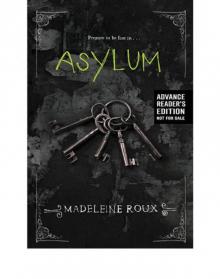 Asylum
Asylum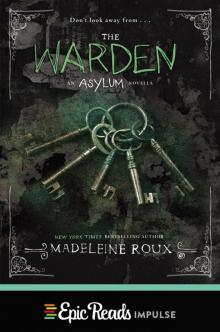 The Warden
The Warden The Bone Artists
The Bone Artists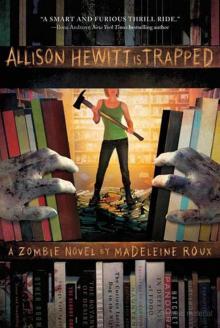 Allison Hewitt Is Trapped
Allison Hewitt Is Trapped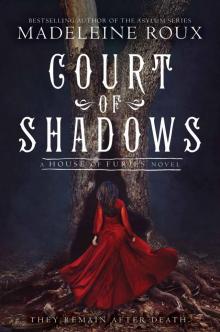 Court of Shadows
Court of Shadows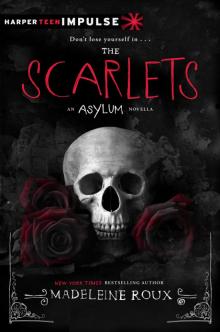 The Scarlets
The Scarlets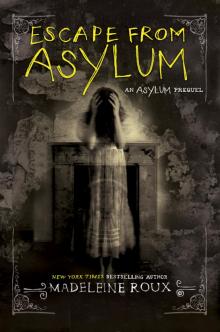 Escape From Asylum
Escape From Asylum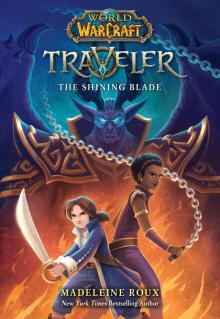 The Shining Blade
The Shining Blade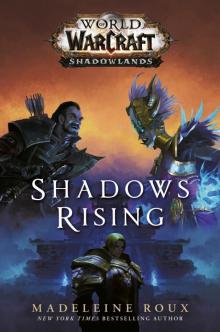 Shadows Rising (World of Warcraft: Shadowlands)
Shadows Rising (World of Warcraft: Shadowlands)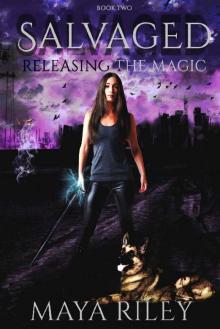 Salvaged
Salvaged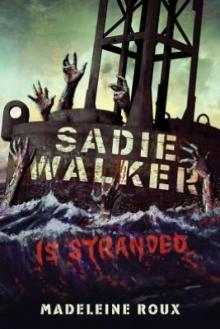 Sadie Walker Is Stranded
Sadie Walker Is Stranded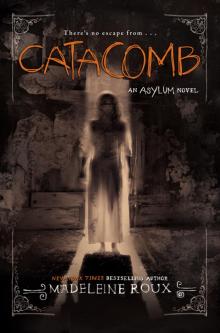 Catacomb
Catacomb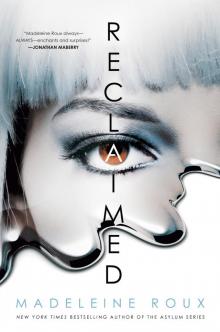 Reclaimed
Reclaimed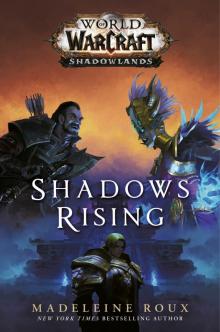 Shadows Rising (World of Warcraft
Shadows Rising (World of Warcraft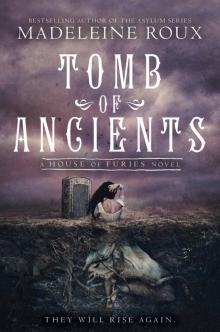 Tomb of Ancients
Tomb of Ancients